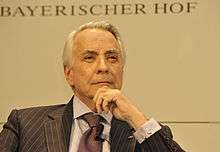Richard Burt
| Richard R. Burt | |
|---|---|
 | |
| Born |
February 3, 1947 Sewell, Chile |
| Alma mater |
Cornell University Tufts University |
Richard R. Burt (born February 3, 1947) is an American businessman and diplomat who served as United States Ambassador to Germany and was a chief negotiator of the Strategic Arms Reduction Treaty. Prior to his diplomatic career, Burt worked as director of a non-governmental organization and was a correspondent for the New York Times.
Early life and education
Burt was born on February 3, 1947 in Sewell, Chile.[1] He attended Cornell University, where he was a member of Alpha Delta Phi.[2] He earned his bachelor's degree, and earned a master's degree in international relations from the Fletcher School of Law and Diplomacy at Tufts University in 1971. Following graduate school, he was selected for a research fellowship at the United States Naval War College. Following this fellowship, Burt moved to London to work as a research associate and later Assistant Director of the International Institute of Strategic Studies. In 1977, he was hired by the New York Times to work as a correspondent on national security issues.[3]
Career

Burt began working for the United States Department of State in the early 1980s. In 1981, he was appointed Director of Politico-Military Affairs, and in 1983 Assistant Secretary of State for European and Canadian Affairs. In 1985, he became the United States Ambassador to Germany.[3] His tenure as Ambassador to Germany coincided with the beginning of the process that would lead to the reunification of Germany.[4] In 1989, President George H.W. Bush appointed Burt as chief negotiator for the Strategic Arms Reduction Treaty (START I) between the United States and the Soviet Union, with the rank of ambassador.[1][3] The treaty, signed in 1991, limited the number of nuclear weapons that the two countries could have.
After negotiation of the START I treaty, Burt left government service and entered the private sector. He has since worked as a partner in consulting firms McKinsey and Company, Diligence, and McLarty Associates. In addition, he has served on boards for Deutsche Bank's Scudder and Germany mutual fund families, America Abroad Media,[5] International Games Technology, UBS mutual funds, Textron Corporation, and Alfa-Bank. Burt is also a Senior Advisor to the Center for Strategic and International Studies[3] and U.S. Chair of Global Zero.[6]
References
- 1 2 "Nomination of Richard R. Burt for the Rank of Ambassador While Serving as United States Negotiator for Strategic Nuclear Arms". The American Presidency Project. February 2, 1989. Retrieved 2009-11-14.
- ↑ The Alpha Delta Phi Fraternity: Among Our Brotherhood, retrieved 15 February 2015)
- 1 2 3 4 "Richard R. Burt". Council of American Ambassadors. Retrieved 2009-11-14.
- ↑ "Richard R. Burt". Center for Strategic and International Studies. Retrieved 2009-11-14.
- ↑ http://americaabroadmedia.org/user/35/Richard_Burt
- ↑ http://www.globalzero.org/en/who/richard-burt
External links
| Government offices | ||
|---|---|---|
| Preceded by Reginald Bartholomew |
Director of the Bureau of Politico-Military Affairs January 23, 1981 – February 17, 1982 |
Succeeded by Jonathan Howe |
| Preceded by Lawrence Eagleburger |
Assistant Secretary of State for European and Canadian Affairs February 18, 1983 – July 18, 1985 |
Succeeded by Rozanne L. Ridgway |